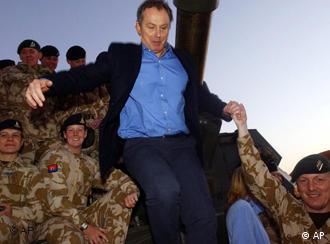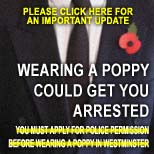"the war itself had causes"
In Tom Stoppard's play, Travesties, set in Zurich in 1917, the diplomat-protagonist Henry Carr reflects on the causes of the First World War: "I forget what they were, but it was all in the papers at the time. Something about brave little Belgium, wasn't it?" Later he wonders if the cause wasn't "saucy little Serbia." The key point is not the truth but effective headlines. As he puts it, "The newspapers would never have risked calling the British public to arms without a proper regard for succinct alliteration."
We forget the causes of war. So many countries, so many names - such difficult sets of belief and complicated histories. Even important politicians can't keep track of which is which. It's much easier to latch on to what the papers say - to news that is often fed to journalists by government sources.
When Tony Blair spoke about the war in Iraq, which he linked with the so-called "war on terror", he used to go back to 9/11 as the day on which everything changed. He described the war as "an eopchal struggle between the forces of progress and the forces of reaction" set in motion by a "poisonous ideology" which had "chosen Iraq as its battleground." (I thought Iraq was chosen by Bush and Blair - but that doesn't fit the myth.)
One odd thing about this war is the way in which the sides change. One week we have one enemy, then another. Sometimes we're fighting Shi-ite extremists, sometimes Sunni extremists, sometimes both together.
 Our allies are a funny lot too. So many people are keen to be against Terror. Russia is a keen ally. Sarkozy seems to be bringing France into the "War on Terror" camp. President Karimov of Uzbekistan was free to torture and murder dissidents and their families, so long as he spouted the "War on Terror" line. Libya was against us. Now Libya is our ally. Today, North Korea announced that it is to be removed from the U.S. list of rogue states. How long our leaders describe Kim Jong-Il as a democrat and friend of freedom?
Our allies are a funny lot too. So many people are keen to be against Terror. Russia is a keen ally. Sarkozy seems to be bringing France into the "War on Terror" camp. President Karimov of Uzbekistan was free to torture and murder dissidents and their families, so long as he spouted the "War on Terror" line. Libya was against us. Now Libya is our ally. Today, North Korea announced that it is to be removed from the U.S. list of rogue states. How long our leaders describe Kim Jong-Il as a democrat and friend of freedom?Rogue states are defined by the White House as states that:
- brutalize their own people and squander their national resources for the personal gain of the rulers;
- display no regard for international law, threaten their neighbors, and callously violate international treaties to which they are party;
- are determined to acquire weapons of mass destruction, along with other advanced military technology, to be used as threats or offensively to achieve the aggressive designs of these regimes;
- sponsor terrorism around the globe; and
- reject basic human values and hate the United States and everything for which it stands.
At the end of 2001 the four main rogue states were listed as Iran, Iraq, Libya and North Korea. Now there's only one left - and the hawks are circling.

Labels: arms trade, Blair, Bush, Iran, Iraq, libya, rogue states, Tom Stoppard, Uzbekistan, war, war on terror



